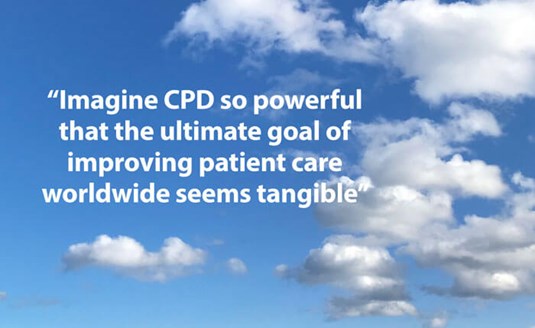If you expect a virtual presentation to be the same as an in-person presentation, just without the live person in front of you, then you have no imagination. Irrespective of the challenges facing us currently with meeting in person during a pandemic, we need to imagine a better way of educating and of learning. Our meetings have become ‘cookie-cutter’ replicas following a format that was easy to duplicate but that has not been conducive to learning. Dr McLean challenges us to imagine a better way.
Imagine. Imagine a continuing professional development (CPD) session where you are totally engaged, where the experts can answer questions that relate on a practical level to your everyday medical needs, where you can be pushed to advance your thinking and debate common myths. Imagine a CPD session where you are welcomed and part of the process rather than a silent onlooker having content pushed your way.
Imagine. Imagine a CPD event where you have access to ideas on the leading edge of your interests and you can interact with scientists and clinicians who are helping to lead quality improvement initiatives around the globe. Imagine that you can influence discussion, that there is a synergistic interaction between participants and presenters and that moderators ensure that varying viewpoints are heard.

Imagine. Imagine CPD that involves opportunity to build consensus and that strives to promote equity and diversity. Imagine CPD so powerful that the ultimate goal of improving patient care worldwide seems tangible.
Imagine.
This is the stuff of great medical CPD. This is the stuff of a great medical conference. This is the stuff of IFOS 2021 in Vancouver, Canada.
The World Health Organization declares that the goal of the CPD should be to improve the health of all people and that “doctors should have opportunities [for] in depth studies when needed to reach a high level of competence in an effective way” [1]. However, effective CPD goes beyond simple transfer of knowledge and well beyond a didactic presentation which has been shown to provide little in terms of practice-changing outcomes [2]. Excellent medical conferences create a diversity of sessions to explore all levels of the Bloom’s Taxonomy model of cognition [3]: knowledge, comprehension, application, analysis, synthesis, and evaluation. These practice-changing conferences use adult learning theory to facilitate dynamic format and content.
But what is adult learning theory? It is not mysterious. Ponder for a moment those times in your medical career, or your life for that matter, when you experienced tangible learning that stayed with you or changed how you practised. Reflect on the times when you were excited to learn and when you left a session motivated and inspired and perhaps aching to learn more. How did this occur? What were common elements in those experiences? (And what were the elements in play when this did not occur, when you were not engaged?) Your answers are the basis of adult learning theory and these principles will help to guide curriculum delivery at IFOS 2021.
“The PowerPoint monologue is a thing of the past. Engagement means true interaction between presenters and the audience and even peers”
The vision of IFOS 2021 is ‘Globalization of Healthcare’ and its goal is to bring together “otolaryngologists and allied health workers to share knowledge and understanding of global OHNS diseases and their treatment.” (www.ifos2021vancouver.com/info-welcome) IFOS 2021 is working tirelessly to promote engagement of all participants and, given this focus, it is understandably grounded in important adult educational principles which include [4]:
- Learning will be relevant to the participant’s practice.
- Learning will be focused on solving a problem.
- Previous experience will be valued.
- The participant can make choices about her/his own learning.
- Active engagement by the participant will be encouraged and facilitated.
- There will be opportunities for peer interaction.
- There will be opportunities for application of learned material.
What do we know about participants in a medical conference? Physicians attend medical conferences for many varied reasons. Many are motivated to improve their performance and seek out specific practice-related information, tools, or skills to improve quality of care [5]. People learn from the experience of others and share best practices. Others are interested in expanding their breadth of the knowledge and often the most well-attended and talked about sessions are those that are related to society at large. Often attendees are interested in the latest innovations to prepare themselves for healthcare’s next horizon. Some try to build consensus. Networking, relationship building and partnership forging are also key factors for many as they strive to create their community of practice and create bonds with like-minded people. And finally, some just are simply looking for a break from the routine of work, an adventure, a chance to move out of their comfort zone or to spend time with old friends or family [6]. All of these are valid reasons and it is likely that different conferences meet variable needs.
By understanding the intrinsic motivations and core behaviours of conference attendees and by basing educational sessions in important adult learning theory, conference organisers can create dynamic opportunities for participants. Does the format matter? In a word, yes.

The PowerPoint monologue is a thing of the past. Engagement means true interaction between presenters and the audience and even peers. Question and answer sessions, polling, real time feedback, small group learning, peer-to-peer exchanges, moderated roundtables, chats, forums, and even virtual reality have permeated the educational realm to meet several of the adult educational principles discussed. Inviting patients and e-patients to sessions increases relevance and focuses on social accountability. Continuing discussions through social media also allows for more robust debate and dissemination. Learning should be inspired. Discussing, debating, defending, applying, and synthesising knowledge are elements that lead to increases in acceptance and ideally improvements in patient care. These techniques also provide a secondary gain: community. By truly communicating with each other, whether it be in person or online, a relationship is forged. These are but a few of the strategies that will be used at IFOS 2021.
However, the world is currently in the midst of the COVID 19 pandemic with uncertainty at every turn. Public health guidelines are constantly and necessarily changing based on complex variables which are not limited to pandemic progression, local factors, and incidence/prevalence. This uncertainty behooves the question: how will COVID-19 affect IFOS 2021?
“Although IFOS 2021 is many months away, it will be a far-reaching conference that will make a lasting impact”
In the last six months, most medical conferences have either been postponed, moved to a virtual platform, or cancelled altogether [7]. Kotter suggests that urgency drives innovation and change [8] and this has been clear in the educational realm in 2020. The need for humankind to prevent viral spread has led to social distancing, physical isolation, small gathering sizes, and reduced travel. These elements, among others, have supplied stimulus for significant innovation in, and discovery of, functional tools that can be used to meet educational and communication needs. Zoom, MS Teams, Attendify and Pathable are but a few tools that have allowed educators and communities to interact, share information, debate ideas, advance research, solve problems, network and analyse data [9]. But these are simply tools - exciting tools indeed - but simply tools because if adult learning strategies are not implemented, the session will be irrelevant.
As Frisch and Greene so aptly point out, “the only thing worse than a long presentation in person is a long presentation virtually.” [10] Whether you adequately address medical educational needs in a conference room, a park, a classroom or an online educational platform, the foundation should remain the same: creating an engaging, welcoming, interactive environment that meets the needs of the participants and ideally helps improve the health of all.
Although IFOS 2021 is many months away, it will be a far-reaching conference that will make a lasting impact. IFOS 2021 is committed to real engagement in CPD and, by implementing sound foundational principles to its scientific and social programmes, it will provide unique and inspiring learning opportunities, physician growth and a chance to create a network of colleagues from around the world. Imagine.
References
1. Continuing Professional Development of Medical Doctors. World Federation for Medical Education Global Standards for Quality Improvement. 2003.
www.who.int/workforcealliance/
knowledge/toolkit/46.pdf?ua=1
Last accessed July 2020.
2. Davis D, O’Brien MA, Freemantle N, et al. Impact of Formal Continuing Medical Education: Do Conferences, Workshops, Rounds, and Other Traditional Continuing Education Activities Change Physician Behavior or Health Care Outcomes? JAMA 1999;282(9):867-74.
3. Bloom B. The Taxonomy of Educational Objectives. Book 1: The Cognitive Domain. New York, USA; Longmans, Green; 1956.
4. Quick Tips – Applying Adult Learning Principles to CPD Planning. University of Toronto Faculty of Medicine. 2020.
www.cpd.utoronto.ca/quicktips-docs/
01-Applying-Adult-Learning-Principles
-to-CPD-Planning.pdf
Last accessed July 2020.
5. Van Hoof TJ, Grant RE, Sajdlowska J, et al. Society for Academic Continuing Medical Education Intervention Guideline Series: Guideline 3, Educational Meetings. Journal of Continuing Education in the Health Professions 2015;35(Suppl2):S60-4.
6. Mishra S. Do medical conferences have a role to play? Sharpen the saw. Indian Heart Journal 2016;8(2):111-3.
7. The effect of COVID-19 on medical conferences and live events. Intouch Team.
www.intouchsol.com/blog/
impact-of-covid-19-on-medica
l-conferences-and-live-events/
Last accessed July 2020.
8. Kotter JP. Leading Change. Boston, USA; Harvard Business School Press; 1996.
9. Conference Management: 5 Benefits to Hosting a Virtual Conference. Oxford Abstracts.
https://oxfordabstracts.com/
blog/2020-03-30-5-benefits-of
-hosting-a-virtual-conference/
Last accessed July 2020.
10. Frisch B and Green C. What it takes to run a great virtual meeting. Harvard Business Review, 2020.
https://hbr.org/2020/03/what-it-takes
-to-run-a-great-virtual-meeting
Last accessed July 2020.




